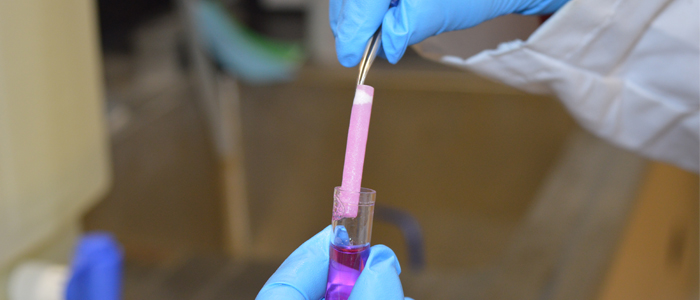Media
Contact
Communications Specialist
Faculty of Engineering
Spencer Engineering Building
Room 2072
Western University
Tel: 519-661-2111 ext. 87015
Email: engineeringcomms@uwo.ca
Mequanint secures $250,000 research grant from Heart and Stroke Foundation of Canada

Western Engineering News | May 5, 2015
By Jason Teakle
Researchers investigating the use of engineered arteries in surgery will be able to get to the heart of the challenges faced daily by surgeons in the operating room – thanks to a recent significant funding grant.
Kibret Mequanint, a Chemical and Biochemical Engineering professor and the leader on the project, has secured a $250,000-grant from the Heart and Stroke Foundation of Canada to support the next phase of his work on growing engineered blood vessels using human cells. The goal is to use these vessels in heart bypass surgeries – and to improve clinical drug testing – before emerging pharmaceuticals hit the market and are prescribed to human patients.
“We have developed the basic technology,” said Mequanint. “We can engineer these blood vessels, but now we’re going to investigate how these engineered vessels compare to the native blood vessels.”
The funding will allow for further experimental lab work to be conducted on arterial pressure, suturing strength and the general behaviour of engineered arteries.
“If we expose an engineered artery to a certain level of pressure, we will be able to see if it can withstand it without rupturing,” explained Mequanint. “We will also look into its suturing strength and if it will be strong enough to hold sutures, and we will be investigating whether engineered vessels behave the same way as our native blood vessels.”
Researchers expect to learn much through tissue analysis during the next phases of the project, including the onset of disease, response to pharmaceuticals and their genetic transformation.
“Studying the behaviour of these cells will give us much info,” he explained. “By interrogating these cells that are in the engineered tissues, we can understand how they will respond to different factors.”
Mequanint noted that an extension of the research grant will concentrate on the study of designing novel stents, which are often implanted in patients following minimally-invasive vascular surgeries.
“We are very excited about the prospects for the future of this project and where we can take this research,” he said. “We’re taking engineered tissues to the next level.”
The Heart and Stoke Foundation of Canada has been supporting Mequanint’s research program since 2008.

